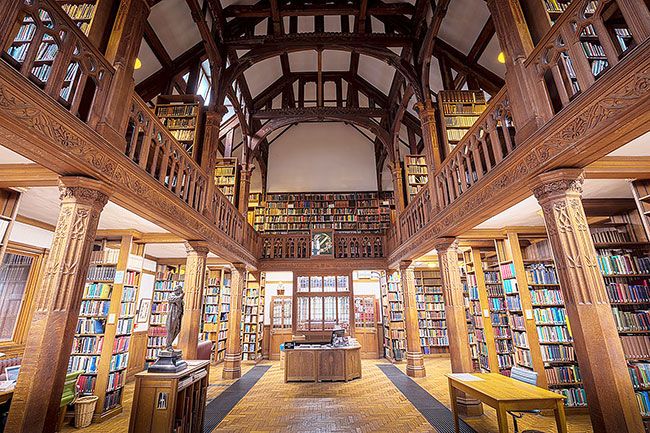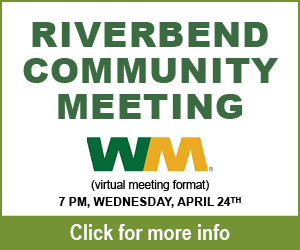Tom Henderson: Quiet thoughts from a library in Wales
Ronald Reagan frequently referred to America as a shining city on a hill.
He was wrong.
At least he misinterpreted what Puritan leader John Winthrop meant in his 1630 sermon, “A Model of Christian Charity.” Winthrop never used the adjective “shining,” nor did he suggest the newly created American colonies basked in an inherently noble destiny.
In fact, he maintained destiny rested with the colonists themselves. If they failed to live up to the noblest of their Christian ideals, Winthrop warned, their failure would be shamefully conspicuous.
They would be as a city upon a hill, their disgrace and ruin visible to all. “We shall be made a story and a byword through the world,” he cautioned.
Therefore, Winthrop said, “We must love brotherly without dissimulation. We must love one another with a pure heart fervently. We must bear one another’s burdens. We must not look only on our own things, but also on the things of our brethren.”
How does that philosophy match with rounding up millions of people, breaking up families and throwing out immigrants — even those who came to this country as children? How does that fit with building walls and rejecting refugees?
The eyes of the world are definitely on this city upon a hill. And many people want to know what has become of it.
That was certainly the prevailing question as I recently sat in a reading room at Gladstone’s Library in Wales. But neither my British hosts nor fellow guests at the library acted sanctimonious.
The people of their own country voted last year to endorse Britain’s exit from the European Union. The Britons sharing the reading room with me face the same bewilderment at Brexit as so many Americans do with the election of Donald Trump.
One of my new library friends was Maria Farrell, a particularly brilliant and insightful writer from Ireland.
She is currently writing a series titled, “Can Democracy Be Saved?” Unfortunately, she has more suggestions than answers in response to that question.
People on both sides of the pond seem to have lost confidence in their foundational institutions, Maria said. The old rules no longer appear to work.
Like frightened animals, they frantically protect themselves and lash out at others. Life in the 21st century has scared many people, perhaps even a statistical majority, virtually out of their wits.
This is how John Winthrop entered the conversation.
He didn’t invent the idea of “a city upon a hill,” of course. He borrowed it from the Sermon on the Mount, where Christ tells his followers in Matthew 5:14, “You are the light of the world. A city that is set on a hill cannot be hidden.”
However, Winthrop entered the phrase into the American lexicon when he used it in his famous sermon, delivered aboard the ship Arbella while en route to the Massachusetts Bay Colony.
Americans pride themselves on their rugged individualism, on winning, on beating the other fellow. However, my favorite passage from “A Model of Christian Charity” might be considered borderline socialism in today’s political climate.
“We must delight in each other, make others’ conditions our own, rejoice together, mourn together, labor and suffer together, always having before our eyes our commission and community in the work as members of the same body,” Winthrop said. “So shall we keep the unity of the spirit in the bond of peace.”
Political developments such as Brexit and Trump’s both confuse and concern me. Yet political developments shift and alter with time.
What truly alarms me is that we, as human beings, seem less willing to make others’ conditions our own. We no longer want to rejoice, mourn, labor and suffer together.
We merely want to shut the door, draw the blinds and cower in the corner, the outside world be damned.
To be fair, that’s one of the reasons my wife and I traveled approximately 5,000 miles to Wales. Gladstone’s Library, located in the tiny village of Hawarden, offers guest rooms for people seeking refuge within the quiet of books. And we were seeking refuge.
We wanted to close the blinds ourselves. We wanted to spend a few days away from the noise and confusion of daily life in the States.
I spent joyous hours reading “The Gospel According to Judas,” by Jeffrey Archer, and being absorbed in transcripts of parliamentary debates about how the principle of Civis Romanus sum applied to the Don Pacifico Affair of 1850.
Although a long story, look it up. It’s fascinating.
With the phone turned off, the city on the hill lay far beyond the horizon, thus well out of our sight.
Of course, that’s merely an illusion in one respect, as England and Wales are just as noisy and confusing as America. And the same questions hang in the air there.
Can democracy be saved? Have we averted our eyes from our community in the work as members of the same body?
I don’t know. Things seem far less shiny to me these days.
But I take some heart in the people I met at the library — people like Maria.
They don’t know the answers either. Still, it’s nice to realize there are people on both sides of the ocean still asking the right questions.
------
Reporter Tom Henderson covers city government, politics and social services for the News-Register. He recently returned from a trip to Britain with his wife, Amy.










Comments
Sally G
Thank you, Tom. So glad you were able to seek refuge for a bit.
Joel2828
What a beautiful and peaceful looking library. I would love to spend and afternoon wandering around in there!
BTW, Ronald Reagan was and is so overwhelmingly loved and admired by (and voted for)by most Americans because he was a man who loved others and had a great vision for how beautiful our country could be. I wish he were still here or that we had a hundred more like him lined up to continue the great things that he started.
Joel2828
...And I don't think Reagan intended to directly quote Winthrop. It was his own vision. Some of Winthrop (and the Bible's) words just helped him to describe it.
And Tom, I bet if Reagan were still alive today and read this editorial he would completely agree with the beautiful and heartfelt sentiments you've expressed.